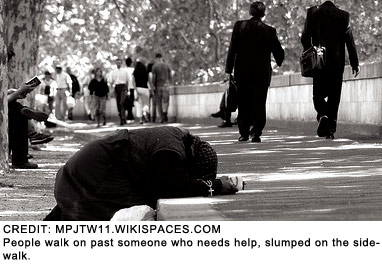The bystander effect

Have you ever been in a situation where you saw someone who you thought might need help, but you weren't 100 per cent sure? You chose to carry on with what you were doing, figuring if they did need help, someone else would help them. Many of us have been in situations like this, whether it was kids play-fighting roughly or hearing your neighbours in a verbal fight.
This is known as the bystander effect: in most cases, the larger the group is, the less likely the person needing help will get it. The bystander effect is not only present in unsure situations — such as not knowing if some kids are playfighting or bullying — it can happen in the case of a real crime.
An example of the extreme negative effects of the bystander effect is the murder of Kitty Genovese in March of 1964. Genovese lived in an apartment complex in New York with many neighbours, and on her way into her building on March 13, she was brutally attacked and stabbed twice by her assailant. After Genovese called for help many times and drew the attention of her neighbours who were watching through their windows, the attacker fled and left her fatally injured. After 10 to 15 minutes, Genovese's attacker came back, stabbed her again repeatedly and raped her while she died. The attacks on Genovese lasted for more than 30 minutes. Approximately 24 of Genovese's neighbours saw the attack; only after the attacker fled the last time did someone call the police.
People tend to not approach others who may be in need because they don't want to feel silly for thinking a person needs help if they don't. Sometimes it may even seem dangerous to get involved in violent situations.
There are ways we can get around these barriers: if you're not sure whether someone needs help or not, ask them for help. For example, you see a couple having an argument, and you think it might get violent — stop and ask them for directions. Communicating with people, even about something seemingly unrelated, will give you a better feel for the situation.
If the situation is more severe, like a group attack or a fight with weapons, call the police. Does it matter if someone else has already called? Isn't it better for the police to get four or five calls than none? If you're still unsure what to do, call a friend or family member and ask them for advice. They can help you feel more confident about your decision.
In the end, it's better to feel silly for trying to do the right thing than regret you did nothing.
Source: Wood, Samuel E., Wood, Ellen G., Wood, Eileen and Desmarias, Serge. The World of Psychology. Toronto: Pearson Education Company, 2008. Print.













